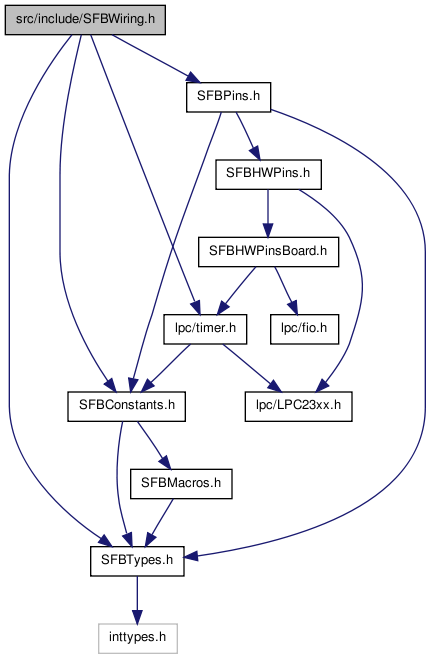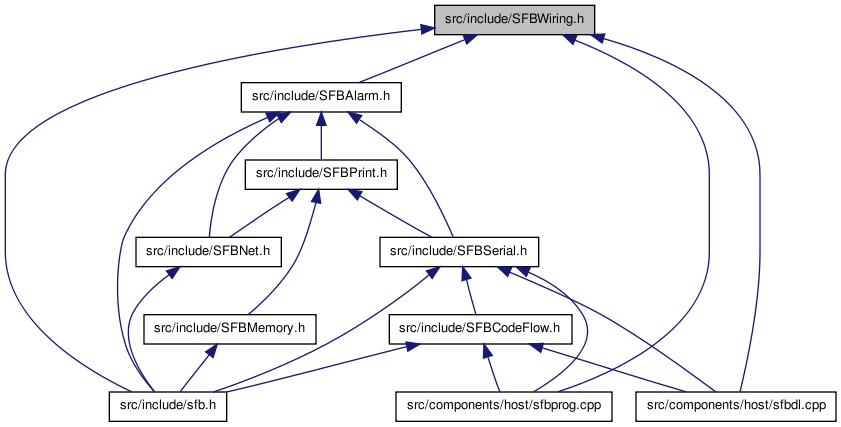SFBWiring.h File Reference
SFB versions of the basic Arduino/Wiring functions. More...
#include "SFBTypes.h"
#include "SFBConstants.h"
#include "SFBPins.h"
#include "lpc/timer.h"


Go to the source code of this file.
Functions | |
| void | digitalWrite (int sfbPin, int value) |
| Set a pin's value. | |
| int | digitalRead (int sfbPin) |
| Read a pin's value. | |
| void | ledOn (int sfbPin) |
| Turn on one of the SFB built-in LEDs. | |
| void | ledOff (int sfbPin) |
| Turn off one of the SFB built-in LEDs. | |
| void | ledSet (int sfbPin, bool on) |
| Turn on or off one of the SFB built-in LEDs. | |
| bool | ledIsOn (int sfbPin) |
| Check if one of the SFB built-in LEDs is on or off. | |
| void | ledToggle (int sfbPin) |
| Toggle one of the SFB built-in LEDs. | |
| void | pinMode (int sfbPin, int mode) |
| Set a pin's function to input or output. | |
| u32 | isPinMode (int sfbPin, int mode) |
| SFB extension: Check if a pin is currently an input or an output (or under reflex control). | |
| void | delayMicroseconds (u32 usecondsToWait) |
| Delay for some number of microseconds. | |
| void | delayMicrosecondsApproximate (u32 usecondsToWait) |
| Delay usecondsToWait by watching for ticks of the main microsecond timer. | |
| void | delay (u32 millissecondToWait) |
| Delay for some number of milliseconds. | |
| void | shiftOut (int dataPin, int clockPin, int bitOrder, u8 val) |
| u32 | pulseIn (int pin, int state, u32 timeoutUsec=1000000) |
Detailed Description
SFB versions of the basic Arduino/Wiring functions.
- Date:
- (C) 2008 All rights reserved.
- Code License:
- The GNU Lesser General Public License
- License Note:
- All code samples shown in documentation are placed into the public domain.
Function Documentation
| void delay | ( | u32 | millissecondToWait | ) |
Delay for some number of milliseconds.
If this function is called from loop(), dispatching (i.e., running packet and alarm handlers) will occur, but if called from a packet or alarm handler, no further (recursive) dispatching will take place, and instead just the delay will happen.
- Examples:
- blinky.cpp, blinky2.cpp, blinky3.cpp, blinkySync.cpp, buttonled2.cpp, eeprom2.cpp, eeprom3.cpp, eeprom4.cpp, fifthdirection.cpp, hallucination.cpp, helloworld.cpp, i2cEeprom.cpp, netled.cpp, pingpong2.cpp, profile1.cpp, profile2.cpp, profile3.cpp, qled1.cpp, reorder.cpp, sdcard1.cpp, sdcard2.cpp, sdcard3.cpp, speed1.cpp, speed2.cpp, speed3.cpp, and timer4.cpp.
| void delayMicroseconds | ( | u32 | usecondsToWait | ) |
Delay for some number of microseconds.
Note this function is not precisely calibrated (and may be equivalent to delayMicrosecondsApproximate(u32), which see). If you need exact microsecond delays you'll need to work up your own custom timing code!
| void delayMicrosecondsApproximate | ( | u32 | usecondsToWait | ) |
Delay usecondsToWait by watching for ticks of the main microsecond timer.
This function is called 'approximate' for two reasons: (1) Because it doesn't attempt to determine where within the current microsecond we are when we start timing, so it might return up to (but not including) one microsecond early, and (2) Because it does not disable interrupts, so it might return late due to interrupt handling.
| void digitalWrite | ( | int | sfbPin, | |
| int | value | |||
| ) |
Set a pin's value.
Following the Arduino approach, this method can also be used to set the pullup resistors on input pins: If the pin is configured as an INPUT, writing a HIGH value with digitalWrite() will enable an internal pullup resistor, and writing a LOW value will disable the internal pullup resistor. (As an SFB extension, it is also possible to set an internal pulldown resistor, see setPinResistor.)
- Examples:
- blinky.cpp, blinkySync.cpp, i2cDAC.cpp, i2cDACFast.cpp, and i2cEeprom.cpp.
| u32 isPinMode | ( | int | sfbPin, | |
| int | mode | |||
| ) |
SFB extension: Check if a pin is currently an input or an output (or under reflex control).
- Parameters:
-
sfbPin The pin number to check mode Either INPUT or OUTPUT for basic usage. Can also be REFLEX_MODE to check if a pin is in reflex mode (rather than checking if it's an input or an output).
- Returns:
- Non-zero if mode is INPUT and sfbPin is currently an input pin, or if mode is OUTPUT and sfbPin is currently an output pin, or if mode is REFLEX_MODE and sfbPin is currently under reflex control; and returns 0 otherwise.
- Blinks:
- E_API_ARGUMENT if mode is not INPUT, OUTPUT, or REFLEX_MODE
- Blinks:
- E_API_BAD_PIN if sfbPin is not a valid pin
- Since:
- 0.9.11
| bool ledIsOn | ( | int | sfbPin | ) | [inline] |
Check if one of the SFB built-in LEDs is on or off.
- Returns:
trueif the sfbPin is on,falseotherwise
| void pinMode | ( | int | sfbPin, | |
| int | mode | |||
| ) |
Set a pin's function to input or output.
SFB extension: Set to 'reflex mode'.
- Examples:
- blinky.cpp, blinkySync.cpp, i2cDAC.cpp, i2cDACFast.cpp, and i2cEeprom.cpp.